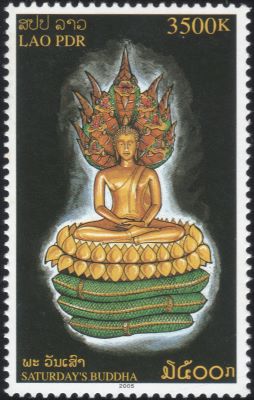
Hyakujo, the Chinese Zen master, used to labour with his pupils even at the age of eighty, trimming the gardens, cleaning the grounds and pruning the trees.
The pupils felt sorry to see the old teacher working so hard, but they knew he would not listen to their advice to stop. So they hid his tools away.
That day, the master did not eat. The next day too he did not eat, nor the next.
“He may be angry because we have hidden his tools,” the pupils surmised. “We had better put them back.”
The day they did, the teacher worked and ate as before. In the evening, he instructed them: “No work, no food.”
Source: http://www.101zenstories.org
Image: A postage stamp issued by Laos in 2005 shows the image of a seated Buddha for people born on a Saturday. Courtesy https://www.buddhiststamp.com/
Hyakujo was a Zen Master who lived in China in the 8th century. He is credited with introducing the first truly independent Chan Monasteries (Chan refers to Chinese Zen), as a new pattern of life for those dedicated to spiritual realisation. Work and farming were a part and parcel of monastic life in Chan monasteries, which enabled the monastery to be self-sufficient. This contributed to altering the perception that monks would be a burden on the society and economy, thereby alleviating the resentment towards persons pursuing a spiritual path. Courtesy https://oshoworld.com/
